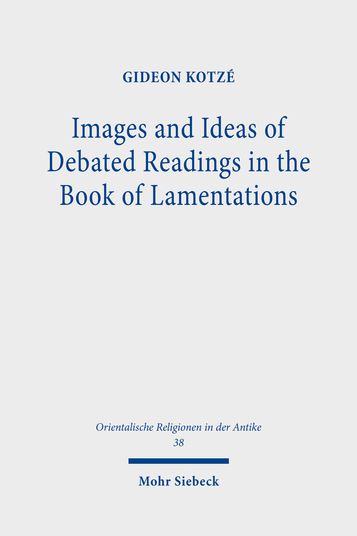AJR is pleased to publish remarks delivered as part of a book review panel at the annual meeting of the 2022 Society of Biblical Literature in Denver. The panel was organized by members of the Disability and Healthcare in the Bible and the Ancient World steering committee.
Read MoreAJR Conversations | Hell Hath No Fury
As early Christian authors continued to build upon and intensify Roman carceral spaces they imagined a system of divine justice in which ever increasing forms of violence are sanctioned by God to elicit proper behavior.
Read MoreHell Hath No Fury: A Response
It goes without saying that I could talk for hours about any one of the questions that has been posed in this forum, but I will just share a few initial thoughts in response to each of the panelists.
Read MoreHell Bound Bodies No More: Unhoused, Disabled, and Incarcerated Bodies in the Ancient Imagination
In her work Henning proves herself to be the first real textual archaeologist of hell: she plumbs depths and asks questions that, with few exceptions, previous scholars did not.
Read MoreA Queer Tour of Hell
One of the many strengths of Henning’s book is the multiple references to contemporary practices and conversations, which highlight the importance of engaging the ancient and medieval tours of hell.
Read MoreWhere, the Hell?
For my part, I want to examine some of the evidence for the material realities of punishment in the Roman world, exploring a few spaces that bring archaeological and affective texture to the penal and carceral language informing tours of hell to which that Henning so insightfully points in her book.
Read MoreHell and the Human
What we find when we do so—with Henning as a surefooted guide through these hellscapes—is a stunningly vivid and visceral picture of how the Christian anthropological imagination actually worked during the formative centuries of the movement and extending into late antiquity.
Read MoreHell Hath No Fury: Gender, Disability, and the Invention of Damned Bodies in Early Christian Literature
Building upon scholarship that sees juridical contexts at the heart of these conceptions of punishment and just desserts, Henning pushes such conclusions further by asking what other assumptions, namely concerning bodies and gender, are brought into our scholarly interpretations of Hell and the afterlife.
Read MoreAugustine’s Latin Christian Synthesis
Augustine drew on the central Christian idea of sacramentum—a technical but expansive concept indicating the mysterious conjoining of the sensible to the intelligible, the human to the divine—to produce a unified theory of existence that stands in contrast to the dualisms of his time.
Read MoreResponse to the Forum on Unfamiliar Selves in the Hebrew Bible
Unfamiliar Selves invites biblical studies to engage in broader discussions in the study of religion through comparison of our primary texts with ethnographic work on spirit possession practices across the world today.
Read MoreJewish Spirits and Christian Specters
“Christianity is a subtler, quieter apparition in this book than it is in much past scholarship on the topic—but it lurks nevertheless, going bump in the night and thereby shaping the discussion in implicit ways.”
Read MoreSelves, Spirits, and the Usefulness of Comparison
Merely establishing the existence of “spirit” language in ancient Jewish texts, rather than identifying its particularity–the local realities with which it intersects and the specificity of the literary representations by which it is constituted–risks evaluating ancient Judaism from the standpoint of Christianity.
Read MorePossession and Relational Moral Agency
“I think we rather need to compare how the modern conceptualizations of spirit possession are similar or dissimilar to the ones in biblical texts. To put it bluntly: We do not need to see what makes an angel in ethnographic data and how people describe angels in order to see which beings in biblical texts might qualify as angels. Rather, we may compare different angel conceptualizations and narratives.”
Read MoreThe Critical Potential of Spirits: Hebrew Philology, the Poetics of Relation, and Unfamiliar Selves
“Flying in the face of scholarship’s “hermeneutical exorcism,” Carlson tells ethnographic stories about people who experience spirit phenomena. Reading their stories has the potential to generate what Édouard Glissant calls the “poetics of relation.” Opportunities for renewed and reconnective perception and perspective-taking, Glissant’s poetics of relation are his key to the project of “transforming mentalities and reshaping societies.””
Read MoreSBL 2022 Review Panel: Unfamiliar Selves in the Hebrew Bible
The 2022 SBL Book Review panel of Unfamiliar Selves in the Hebrew Bible: Possession and Other Spirit Phenomena (De Gruyter 2022) by Reed Carlson. The panelists were: Jutta Jokiranta (University of Helsinki), David Lambert (University of North Carolina), Ingrid Lilly (Wofford College), and Ethan Schwartz (Villanova University).
Read MoreMultilingualism and Translation in Ancient Judaism
Steven Fraade provides a preview of his forthcoming publication on Multilingualism and Translation in Ancient Judaism (Cambridge University Press, June 2023).
Read MoreRetrospective | My Journey with the Dead Sea Scrolls
“I often think that scholarly understanding of the biblical Dead Sea Scrolls and I grew up together; over the years, and now decades, a paradigm shift has occurred in the field, and my own views have changed along with it.”
Read MoreRediscovering Enoch from the Fifteenth to Nineteenth Century
Annette Reed introduces the dynamic range of scholarship in a new edited volume discussing Enoch’s modern reception.
Read More"Going West" in Talmudic Literature | Publication Preview
Reuven Kiperwasser shares his process of writing Going West: Migrating Personae and Construction of the Self in Rabbinic Culture in his own transient state.
Read MoreImages and Ideas of Debated Readings in the Book of Lamentations
The project Kotzé sets out on, then, is more than a guide for text critical issues in Lamentations. It seeks, rather, to blend text criticism with an interpretive process keen on finding contemporary parallels in neighboring cultures.
Read More

















